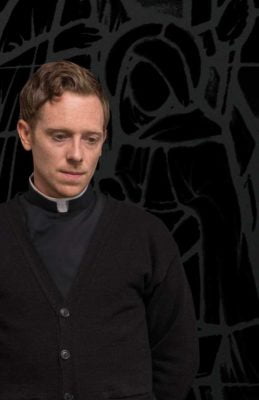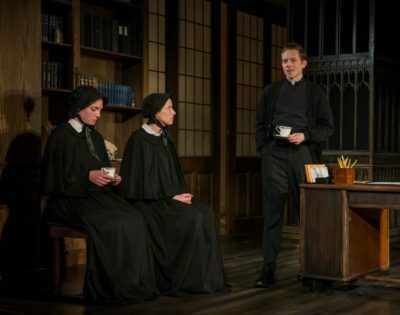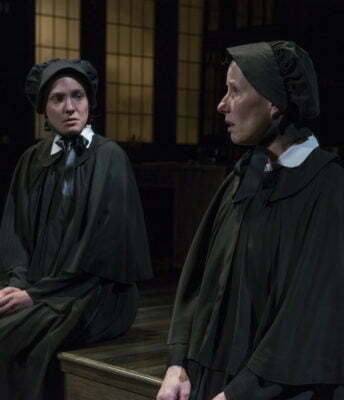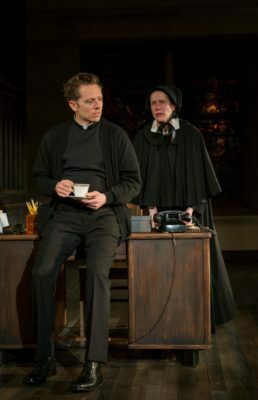Doubt: a Parable

By John Patrick Shanley
Directed by William Brown
Produced by Writers Theatre, Glencoe
Strong Performances Rise to Shanley’s Work
“They’re Children, They Can Talk to Each Other.”
By now, it is likely that most theatre-goers are aware of Doubt: a Parable, John Patrick Shanley’s Pulitzer and Tony Award winning 2004 drama. For the uninitiated, Doubt depicts a Roman Catholic nun and school principal in 1964 who believes, but has no proof, that a priest is sexually abusing one of her students. But Shanley has said his intention was not to explore that particular scandal, so much as the loss of confidence in authority, and the conflict between necessity of action and lack of information. Doubt was the first of a trilogy of plays about these themes, and remains by far the best known, although Shanley’s new play, the much more light-hearted Outside Mullingar, recently performed at Northlight, has also proven popular. The new production by Writers Theatre especially emphasizes questions over biased application of power, and keeps the show as confusing as ever.
Sister Aloysius Beauvier (Karen Janes Wositsch) is not popular, and that’s just how she likes it. The first time we meet her, she has just called eighth grade teacher Sister James (Eliza Stoughton) into her office for a talking-to. Sister James is too personable with her students. A proper teacher, Aloysius says, should make children uncomfortable, so they know they cannot get away with misbehavior. She should also be suspicious of everything—when a student gets a bloody nose, might it not be self-inflicted? And don’t sympathize with smart students who get low grades because they’re bored; talents are only good when used pragmatically. Sister James wants to please her superior, but everything Aloysius says seems contrary to the ongoing Vatican II reforms, and the attitude of the priest, Father Flynn (Steve Haggard). He seems to have a great relationship with the boys in the school.

Aloysius becomes especially concerned after one boy, Donald Muller, behaves strangely one day after being alone with Father Flynn. Donald is the only black boy in the working class Irish and Italian school, and is therefore isolated and vulnerable. The priest is a big believer in being a part of the community: casually interacting with parishioners in their everyday lives, performing services in English, allowing secular culture into school functions, cultivating trust.Sister Aloysius hates that. After convincing herself that Flynn needs to be stopped, she embarks on a quest to destroy him at all costs, even if it means alienating all around her and losing her position.

While Writers Theatre’s new building is under construction and The Diary of Anne Frank is running in their usual space in Books on Vernon, Doubt: a Parable is being performed in the Glencoe Union Church, which was their rehearsal space for other productions. Set designer Kevin Depinet is forced to incorporate the church architecture into the play, and succeeds in creating an imaginative location that exudes the symbols of aged power. The more interesting effect of this location is that it requires the actors to move around the “wings” and back of the audience in a way commonly associated with the fringe theatres which are normally found in churches and other found spaces. This sort of production prompts an analytical frame of mind, and justifies abstractions.
Woditsch is not old, which is relevant to Sister Aloysius’s being a WWII widow in 1964. That she and Father Flynn would therefore have less of an age difference than usual makes their conflict personal, instead of generational. Haggard’s Father Flynn seems to be good-humored, clever, personable, and humble, yet firm. Were it not for our knowledge of how widespread church cover-ups were at the time, Sister Aloysius’s campaign against him would seem factually baseless and entirely driven by animus. As the guileless Sister James, Eliza Stoughton loves complementing people, and has a strong desire to enjoy life. She resents Sister Aloysius for planting suspicion in her mind as much as she does Father Flynn, though she’s worldly enough to recognize what Aloysius is accusing him of without needing it explicitly stated. Ann Joseph plays Mrs. Muller, Donald’s mother, who appears for only a single scene, but gives a memorable performance as a third perspective on a cover-up: someone who finds the accusation credible, but chooses to turn a blind eye. It is remarkable and troubling that rather than heartless, her character comes across as someone who has suppressed her emotions for what she perceives as the greater good. Aloysius considers her monstrous, but prior to meeting her, she, too, had been determined to keep her suspicions from “getting out,” of the Church, even though she was certain of them.

William Brown, who recently directed Tis Pity She’s a Whore in Urbana, has a knack for bringing out the psychological conflicts in his characters. In the case of Doubt, while Shanley’s script provides plenty of institutional conflict, Brown contributes a focus on Aloysius’s actions. The play remains as ethically confusing as ever, but the added emotional impact of Sister Aloysius’s personal foibles, which do as much to create the atmosphere of cover-up as ignorance, makes it all the more uncomfortable. Writers Theatre artistic director Michael Halberstam commented that he is reluctant to stage a well-known play unless there is something new the company can bring to it, and I think casting Woditsch accomplished that. I can’t guess what emotional impact entering a church to see this play will have on people, but it was my experience that the tall, temporary seats added a sense of tension to the evening. Not because I was seriously concerned about safety, but because the production was intimate, yet I viewed it in its odd space from an odd angle. Writers Theatre’s Doubt provides new fuel for thought, even to those already familiar with the story.
Highly Recommended
Jacob Davis
[email protected]
Reviewed May 6, 2015
This show has been Jeff recommended.
For more information, see Doubt: a Parable’s page on Theatre in Chicago.
Playing at Glencoe Union Church, 263 Park Ave, Glencoe. Tickets are $35-75; or order, call 847-242-6000 or visit writerstheatre.org or 321 Park Ave. Plays on Tuesdays and Wednesdays at 7:30 pm, Thursdays and Fridays at 8:00 pm, Saturdays at 4:00 pm and 8:00 pm, Sunday at 2:00 pm and 6:00 pm, and select Wednesdays at 2:00 pm through July 19. Running time is ninety minutes with no intermission.
